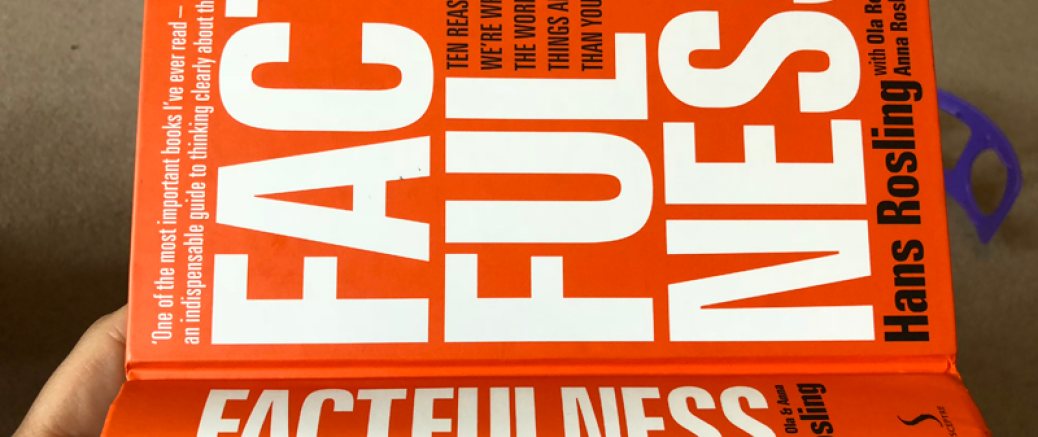If Spock wrote a book to earthlings, it would probably be Factfulness, Hans Rosling’s swan song. It tells us that the world is a better place than we think, but that the way we think is dysfunctional.
Hans Rosling’s book comes with some hype: Bill Gates is quoted on its cover, saying it’s one of the most important books he ever read; it was selected as book of the week on BBC Radio 4; and politicians in my home country of Denmark wants to give it away for free to all high school students.
Now if I could give one book away to every student it wouldn’t be this one: it’s definitely a good book, but not that good.
Factfulness weaves together Hans’ life with facts about the developing world - sorry, with level 1, 2 and 3 countries - and thoughts about how to think about problems.
It makes the important point that us living in level 4 countries, the richest in the world, have little to no idea about how everyone else go about their daily lives. We constantly underestimate the level of education, health and welfare in these countries. This is due to ten instincts we wrongly use when assessing the world. These instinct - or biases - are especially problematic because it halts or distorts important investments.

Life in level 1 to 4 countries. From http://www.gapminder.org/dollar-steet.
The book really takes off when it draws on Hans’s life as a doctor. Instead of just telling one “how to think” it becomes a book about doing the right thing. A potent example - almost a real world Drowning Child problem - happens between Hans and a visiting colleague when he’s the sole doctor in the Nacala district, Mozambique in the 1980’s. With over 100.000 patients and a child mortality rate of up towards 25%, Hans accepts a less than perfect treatment for an infant one night: any time spent now, needs to be subtracted from other patients tomorrow. His visiting friend disagrees: you must do everything possible for the patients in your care. Everything else is just theoretical guesswork.
Hans wants numbers to illuminate the discussion: 52 children die every year in the hospital where he works; and another 3900 in the district. Hence he should be spending his time on all those mothers and children outside the hospital, not just the ones that make it in. Like Peter Singer, Hans is an utilitarian: help as many as possible. If you do something perfect, you are stealing resources from where they can be used better, he quotes an African women as telling him.
I found the real life stories from Hans life to be the best parts of the books - but because it is extremely focused on pushing “factfulness”, ten thinking heuristics to counter our poor instincts, it unfortunately contains few reflections on his own philosophy or situations where the heuristics clash. At places the book feels more like a sales pitch then an argument. Hans uses the above example from Mozambique to illustrate an instinct we use: that we tend to get sizes wrong. We focus on individuals when we should be thinking about proportions. In the above example, that of course implies that we all agree that saving the most people is the right thing to do: but it could reasonably be argued that, actually, resources should be allocated towards the weakest in society, not just the many.
Interestingly, later in the book - when discussing how urgency distorts our thinking - Hans seems to realize that an utilitarian heuristic might not, in fact, always be the best. In the same district in Mozambique, a strange new disease breaks out. Not knowing what is going on, he reluctantly agrees to close down the roads into the city center to stop any spread. When people start using boats to get into the city instead, they capsize and many die. Hans blames himself - and his ‘urgency instinct’ - for the deaths. Now if it had turned out the mysterious disease had been Ebola, any utilitarian would probably have found this an regrettable but ultimately acceptable: save the city by isolating it. But the example illustrates that no matter how many facts we have or how clear our thinking is, there are situations where we simply can’t know. It's in these situations ethics come to the foreground: the book however doesn’t seem to accept that this should ever happen. It’s a Vulcan approach - gather alle the data and think logically! - which ultimately will fail on a human world.
I enjoyed reading Factfulness - it contains many great points and promotes a fact-based approach to the world that, if we all used it more, will give us more freedom. Some of the instincts are a bit forced and other described in other books such as “Thinking fast and slow” by Daniel Kahneman, but that doesn't matter too much: they get a wonderful twist when seen through Hans’s experiences. At places, it sacrifices reflection for sales pitches, but the autobiographical anecdotes are brilliant and really makes the book worth reading.
